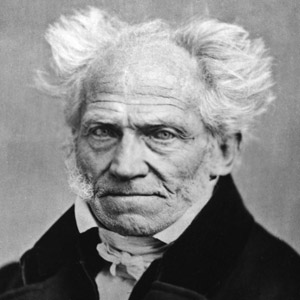
Arthur Schopenhauer (1788 – 1860) was a German philosopher who was born in the city of Danzig. He is best known for his 1818 work The World as Will and Representation, which he expanded in 1844. He was often referred to as “the philosopher of pessimism,” although the focus of his work was on finding a way to find to overcome the fundamentally painful human condition. Schopenhauer was among the first thinkers in Western philosophy to share and affirm significant tenets of Eastern philosophy, having initially arrived at similar conclusions as the result of his own philosophical work. His writing on aesthetics, morality, and psychology have influenced thinkers and artists throughout the 19th and 20th centuries.

Quotes by Arthur Schopenhauer…
If you come across any special trait of meanness or stupidity… you must be careful not to let it annoy or distress you, but to look upon it merely as an addition to your knowledge — a new fact to be considered in studying the character of humanity. Your attitude towards it should be that of the mineralogist who stumbles upon a very characteristic specimen of a mineral.
You will see that in dealing with fools and blockheads, there is only one way of showing your intelligence — by having nothing to do with them. That means of course, that when you go into society, you may now and then feel like a good dancer who gets an invitation to a ball, and on arriving, finds that everyone is lame — with whom is he to dance?
We are often wiser than we fancy ourselves to be… In the great moments of life, when a man decides upon an important step, his action is directed not so much by any clear knowledge of the right thing to do, as by an inner impulse — you may almost call it intuition — proceeding from the deepest foundations of his being.
Take another example: a room full of guests in full dress, being received with great ceremony. You could almost believe that this is a noble and distinguished company; but, as a matter of fact, it is compulsion, pain and boredom who are the real guests. For where many are invited, it is a rabble — even if they all wear stars. Really good society is everywhere of necessity very small. In brilliant festivals and noisy entertainments, there is always, at bottom, a sense of emptiness prevalent. A false tone is there.
The mason employed on the building of a house may be quite ignorant of its general design, or, at any rate, he may not keep it constantly in mind. So it is with man: in working through the days and hours of his life, he takes little thought of its character as a whole… It is only when we come to view our life as a connected whole that our character and capacities show themselves in their true light; that we see how, in particular instances, some happy inspiration, as it were, led us to choose the only true path out of a thousand which might have brought us to ruin.
All truth passes through three stages: First, it is ridiculed. Second, it is violently opposed. Third, it is accepted as being self-evident.
